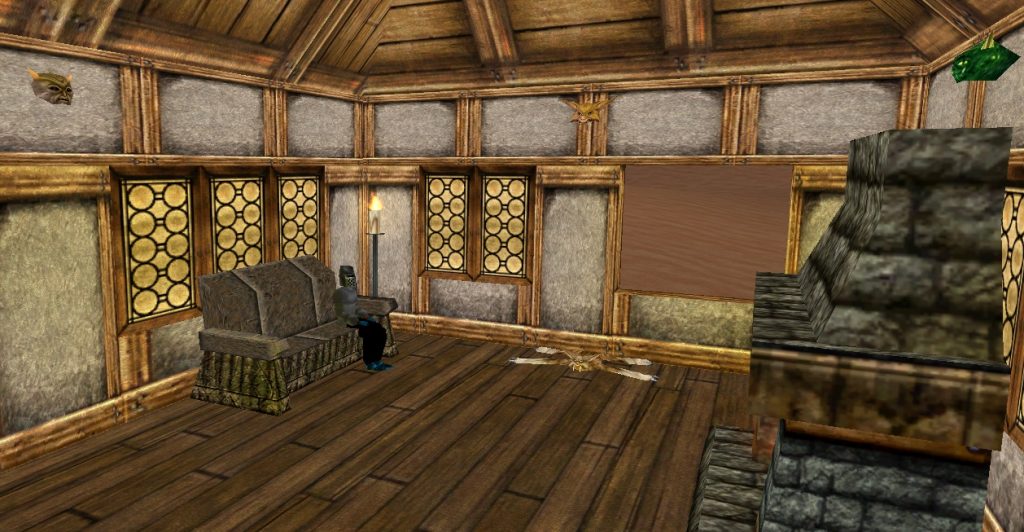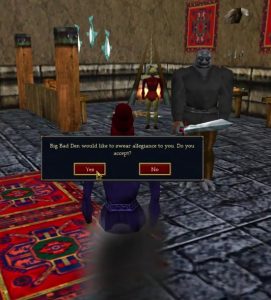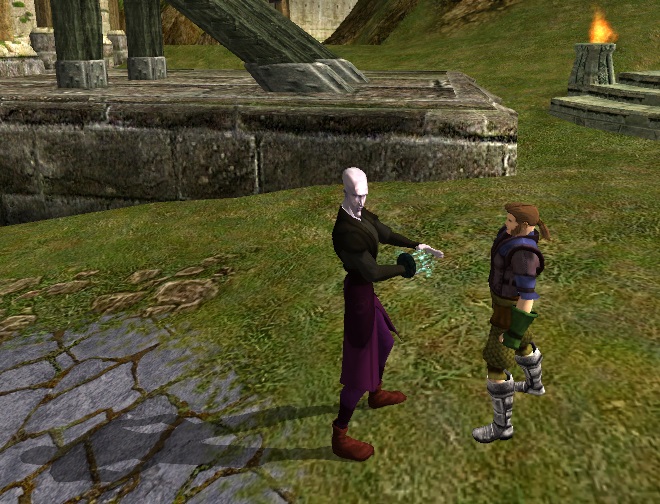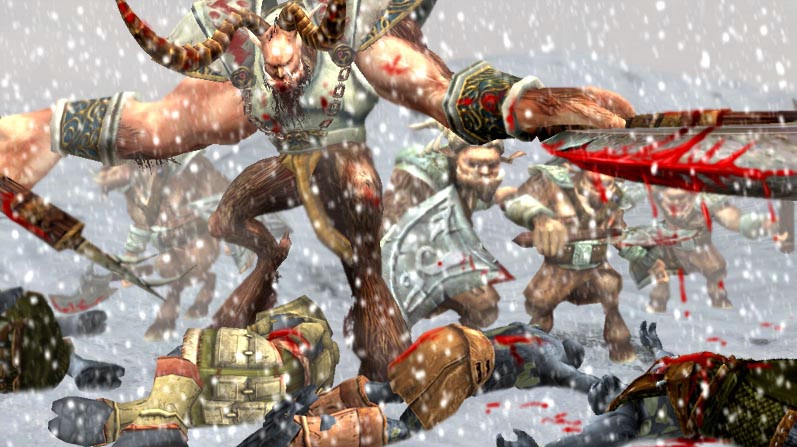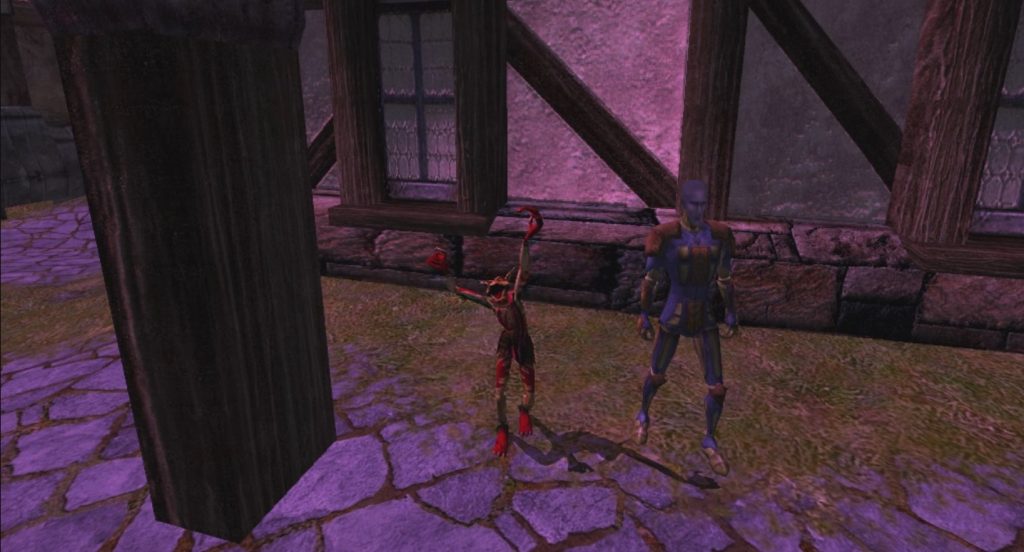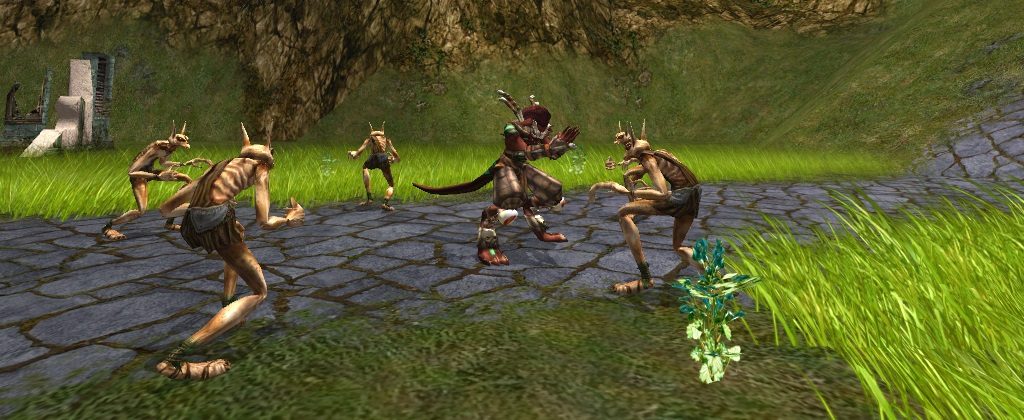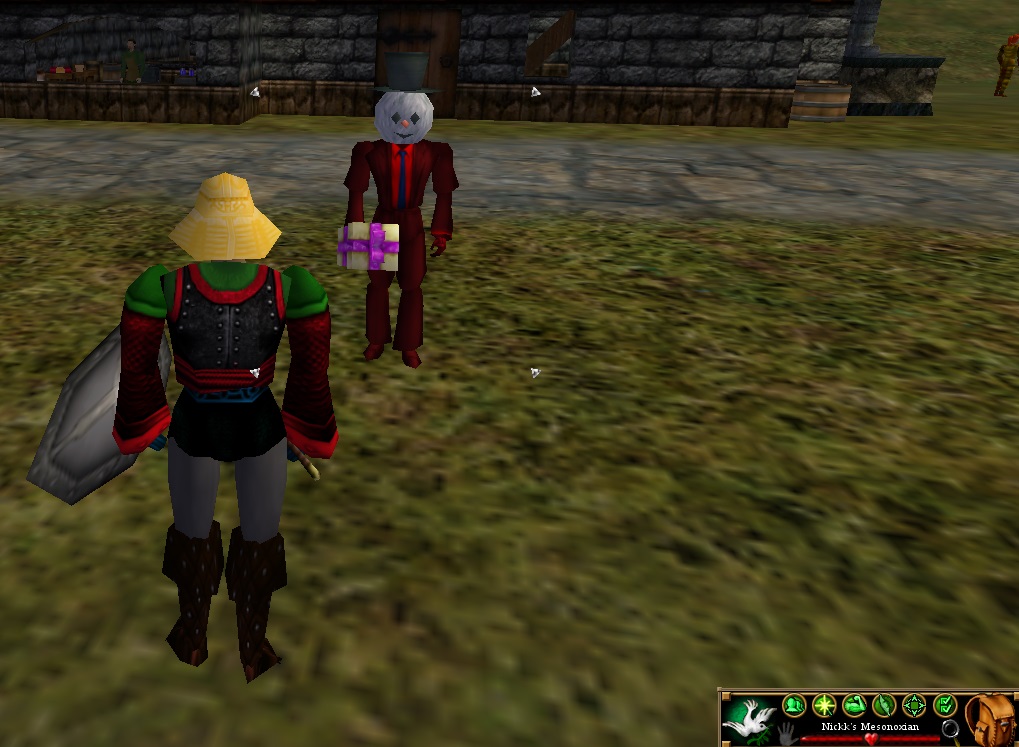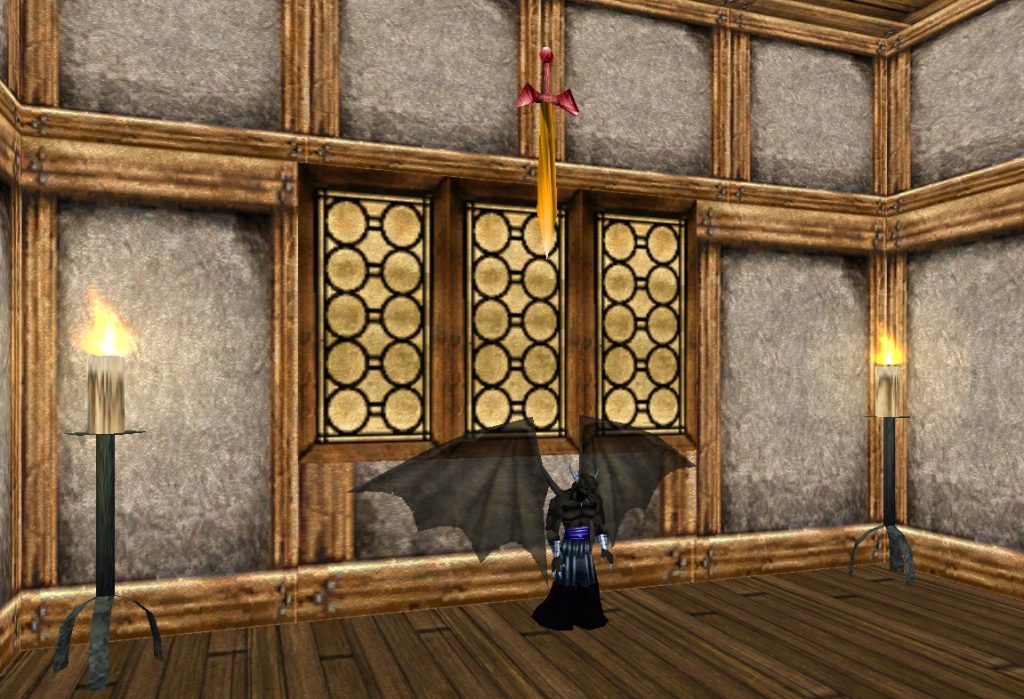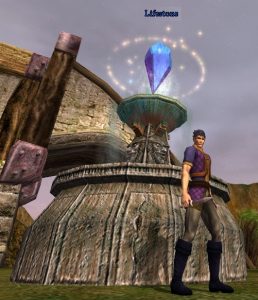
As Asheron’s Call 1 & 2 are going offline shortly, I thought I might give it a final send-off with a list of things I learned from the series. Maybe it’s cheesy, but I really did grow up in Dereth. Some kids get their life lessons from sports, girl/boy scouts, farm life, church life, alien abduction camp life, and so on, but I learned a lot with the help of the AC series and the people I played with. I’ll focus on 10 life lessons learned from the Asheron’s Call series, but trust me, it’s more than that.
1. Get some perspective
Asheron’s Call took place in a single seamless world. No instancing. If you wanted to kill the new big bad, you literally had to stand in line or risk community exile, as people regularly got blacklisted.
However, as the genre was still young and most of the world was essentially undocumented (in game), people got attached to their hunting spaces. When some random guy found my grinding spot, I got upset and tried to run him off. My patron (essentially a guildie who recruited you to the guild and acted as your mentor) took me to the side and asked how I would have felt if I had found a new area to explore, only to have someone tell me to GTFO.
That was the first and last time I did that (in a PvE area). Like most lessons, the first time wasn’t enough. When I tried putting my (terrible teenage) AC fanfiction online, I had people come in and critically rip up my stories, including (supposedly) a college professor. I was 13 years old. As a kid, most people tell you wonderful things just for trying, but AC fans weren’t always nice, and they weren’t always aware that I was a kid. Again, though, I actually learned once I understood their perspective. Just because I knew certain game locations and their significance, it didn’t mean other people did, so I learned to better communicate through writing.
Heck, understanding where I disagreed with people helped me refocus my energies. If someone kept using fire attacks on a fire elemental and dying, I could call them stupid or could realize that they didn’t know damage types matter, meaning someone should teach them. Maybe as adults, we don’t think about this or when we noticed it, but it makes interacting with other people much easier, and that’s really important for hormonal teenagers who are constantly unsure of why they’re hulking out all the time. It’s also great for teachers and writers that have to worry about smart people realizing how little we sometimes actually know (please don’t tell anyone!).
2. Your reputation means everything… and nothing.
I mentioned being blacklisted for doing stupid things in AC1&2. Unlike modern MMOs where you’re randomly forced to group with people for the sake of convenience, even the original World of Warcraft lacked a dungeon finder at launch. WoW players often picked Progress long before Social Grace. AC‘s progress was limited and smaller in scope, making the game far more social. As such, problem people would be reported to their patron or monarch (guild leader). If neither at least hinted that he or she cared, gossip ensued and that entire guild might have been blacklisted. Without name changing services, players would have to make a new character, try to find a new guild that would accept them, do something to fix their image, or quit to avoid a blackened name. It was more than just being a good person; it was making sure you kept good company.
It didn’t always matter, though. If you were a power player, some people would blacklist you out of jealousy. If there were a relationship situation and things went sour, one person would get shamed and blacklisted. Heck, some people were the bad guy just because it was needed, such as when Turbine made use of a past developer-led roleplaying scenario to convince a monarch to aid them in killing a key lore creature, the Shard of the Herald.
3. Ranks and titles are earned socially first, skillfully second
Unlike your reputation, which is just word of mouth, ranks and titles are granted by social structures, systems that are so real that people sometimes forget that we just made them up. I know this myself because I’ve run my own guilds and made up titles.
Maybe it’s not always true, but I’d wager most people have their ranks based on social skills and connections first, merit second (at best). For example, my patron wasn’t a guild officer, and she only got to rank three of ten in the allegiance system, but she was super nice. People always told her their problems, in character, in game, and in real life. She used to joke that she should have been a bartender. People I didn’t even know would see who my patron was by looking at my character sheet and would remember a time she helped them. I was super proud to be associated with her, and always wondered why she was never promoted higher in the guild so she could help deal with member issues. Turned out it was because she didn’t want the extra responsibility, even though she was essentially doing the job.
However, several high ranked monarchs with fancy titles like “Duke” or “Amir” were total jerks (not Wren the Blurry though!). The Shard of the Herald event really brought out people’s true natures. Some of the people on the Shard Defense Memorial were the kind of people who would take the time to write an extra cruel message to you if you asked for help, or who would taunt you for making a “bad” character even if you were having fun. Without getting too political, I want to say this is still true today. Respect is earned through actions, not titles.
4. Communicate, even if it’s embarrassing
Time to get personal. I hinted that certain events in AC2 caused some of my friends and me to do something “bad,” which was changing factions. Our side was aggressively dominating the PvP scene to the point that we’d nearly killed it. Since factions weren’t attached at character creation, people started to join our side just so they could be on the winning team too. We liked PvP and wanted it to stay healthy, so most of my group agreed to change factions to try to help the weaker sides out.
The problem was that my brother, who was a key part of our group, didn’t agree. Changing factions meant we’d have to leave our guild, and it was probably the best on the server. It also meant having to fight against people we liked, and he didn’t want to do that. The problem was, well, I was always jealous of my younger brother. He was more popular than I, smarter than I, and despite people accusing us of looking like twins, he was better looking too, and he and his friends would remind me of my shortcomings at times. Naturally, none of this was said aloud.
During a PvP scenario my new faction had planned, something happened that made us think he’d betrayed us. I thought he was trying to keep me down in game as well as real life. My group suspected it too. Without anyone asking for it, he apologized in voice chat, but it was taken as an expression of guilt. They were devastated. For days, I was seething and he was unwilling to speak. I was furious, but I didn’t express it in the right way.
Eventually, my mother intervened. She made us talk. No more hiding in our rooms or name calling; we had to talk. It was really, really painful, but I still look back at that day as the day my brother actually became my friend. It was a huge misunderstanding, but he was most upset because he knew how things looked, and worse, that we’d believe he’d do something like that to us.
I’ve seen it happen several times since. Raid loot issues, promotion jealousy, PvP betrayal. It happens, but often it seems like it’s a matter of people unwilling to just put aside their ego and say how they really feel. Putting pride aside to communicate was an advantage I feel like I had over other foreigners in Japan when working with people from different cultures, but I never would have gained it if it wasn’t for Asheron’s Call 2 and my little brother.
5. Treat your enemies well
It’s likely that at some point in your career as a gamer, you’ve had guildies you just can’t stand, maybe even loathe. However, when a game’s very social, having enemies, while entertaining, can make the game a lot less fun. Since I was worried about my reputation and that of my patron in AC1, I’d behave like a good boy. Publicly, I wouldn’t say anything rude or express how much I disliked a person, at all. Period. I actually found out later that some of them didn’t even realize I disliked anyone, let alone suspected me of not liking them.
And yet, they were people who helped me. They were people who’d invite me to do a quest I might have missed out on, or help me get my corpse back if everyone I liked was asleep. Some of them even grew on me. One or two people didn’t hide their dislike of me, but I never let on, and years later, learned that, behind the scenes, people were constantly ragging on that person for their actions. Because I was always nice to them, people stood up for me even when I wasn’t there.
I wish I’d learned that the first time. In AC2, I eventually was the guy in charge. I admittedly lashed out at some people on forums that are thankfully gone. However, when I changed to the faction that one of these people had joined, they antagonized me. They set out to sabotage me at every turn, and of course, I didn’t make it any easier. There were former enemies that I had treated well, and they stuck up for me, but not this guy.
If I’d been smarter and kept my mouth shut, I could have worked with the guy. He had a little pull, so his dissent had meaning. It was just people being jerks on the internet, but it’s stuck with me, especially when my first AC2 PvP victim, who I was nice to, ended up being my super cool guild and raid leader in vanilla WoW. Again, it’s a lesson I employed in my cross culture experiences nearly a decade later, and trust me, fighting a war of kindness is much more fun (and fattening).
6. Know your self and your self-worth
This has nothing to do with having a fat head and everything to do with perspective. Again, I wasn’t really famous or anything in either Asheron’s Call game. However, my brother was in a high-end guild. Since my brother had connections, it was easy to see his value. For me, it was a bit harder. I led some group quests for people in and outside my guild, but since my character was weak, I was probably known more for dying, except among close friends. I knew I wanted to play with the big boys and was invited to do some cool things from my brother’s guild, but I never thought it was because I was a good player.
It turned out I was wrong. When a set of quests was introduced that required two players to control levers to allow each other passage through two, separate dungeons, it highlighted how good my patron and I were at organization and communication… and how poor the people we played with were. People were amazed that we were clearing a dungeon they had thought was meant for tens of people with just the two of us, and I’d received messages from my guild leader asking me to help other guildies with it.
This followed us into AC2. We initially tried to make our own guild, but the person who wanted to be our leader wasn’t very serious about the game and eventually quit the guild. It wasn’t so much that he’d left but that people had seen promise in my friends and I, only to meet the guild leader and be disappointed. Another guild with some big name Shard Defenders saw us in action and invited us to join. Again, leadership was lacking and they dissolved, but we’d made enough of a name for ourselves for other guilds to try to poach us. We knew we wanted to experience high end play, but kept joining social guilds. It was our fault though, not theirs.
Eventually we hit the motherload: a high-end guild that mostly didn’t take itself too seriously and knew the value of communication. Not only that, but we’d learned that at least two Turbine employees were members of the guild. They never fed us any information (though we found out they did watch us when we were the first to do new content), but it was exciting to just chat with them like regular people.
We fit in with them quite well for a time. Even though we’d eventually part ways and some of their members held a bit of a grudge, leadership understood our situation and still invited us to fill in the gaps when non-faction events were happening. As people knew who our former guild was, we were still in demand. If we hadn’t taken the time to figure out what we wanted or listen to public opinion, we wouldn’t have had such a great experience. The same’s true in life: I realized that I love writing and (attempting) to teach people, especially in terms of culture. I’m sadly between full time jobs right now, but I’ve gotten to do some really cool stuff, from being a volunteer “bodyguard” for a J-POP band to teaching English at my alma mater.
7. Help your community
By now, you can probably see a bit of a theme: I learned a lot about myself by helping others. It’s amazing how you can help some newbies one day and have them eventually surpass you in game power but still look up to you. My involvement in the AC community helped me not only in the AC series and in future games, but with community organization in general. In fact, I recently was talking to some important people at a big company (they’re not primarily an MMO company, but you’ve all heard of them), and AC came up as a talking point several times. You never know how your community involvement will help you indirectly, so even if the moment feels harsh, remember that you can draw on that experience in the future.
8. Give freely or don’t give at all
Asheron’s Call’s allegiance system really was something else. Yes, it was an XP pyramid scheme, but one based on socializing. It made people into a currency you constantly had to earn. The loss of a single follower meant losing everyone sworn to that follower too, costing you rank and sweet, sweet xp.
And I wanted a vassal. I was constantly helping other players and giving out newbie loot, but always finding people who just wanted free stuff. It was frustrating that, much to my chagrin, the system could be abused from the lower side. It made me mad until I realized I was supporting their habit. If I wanted to give stuff to people, I should just give stuff. It worked with my friends. With potential followers, I had people perform “tasks,” like figuring out how to retrieve their corpse from a minor minion solo, and then I’d give them better stuff. Sure, they all left me for patrons that showered them with free gear, but it was their loss. Sharing is caring, and the people who take and give selflessly are worth keeping.
9. Make the most of your hobby
AC led to helping me expand my knowledge of culture, history, mythology, language, writing, roleplay, social skills, psychology, and probably more. It helped me turn my brother into my friend, and a friend into my first real boss. In real life, I was kind of a loner, but in game, I learned valuable social and leadership skills that’ve helped me as a teacher, writer, and friend. If you just want to log in and forget your life for a few moments of escapism, that’s fine, but don’t assume that’s the only way to play. If you’re intentional about your gameplay, you’ll find ways to learn from it and bring it into your real life. Remember, games are simulations! Especially as a gamer, we can play with new ideas, try to apply them in our lives, and then go back in game to try something else.
10. Failure is inevitable, but the lessons you learn aren’t
My patron used to say, “If you’re not dyin’, you’re not tryin’.” It was true. I remember playing with people who were so afraid to die that they’d never experience some of the biggest highs in the game. I still sometimes regret never switching to PvP to become more than a pizza boy in the Shard Defense event, but I felt like I made a mark in Asheron’s Call 2, even if I was unable to help rally a failing faction. But I learned things on the way. At least these ten things, and I’ve used them in my daily life. It’s worth something, and while I know I’m going to go out and fail more, I’ll strive to make sure I learn something from it.


